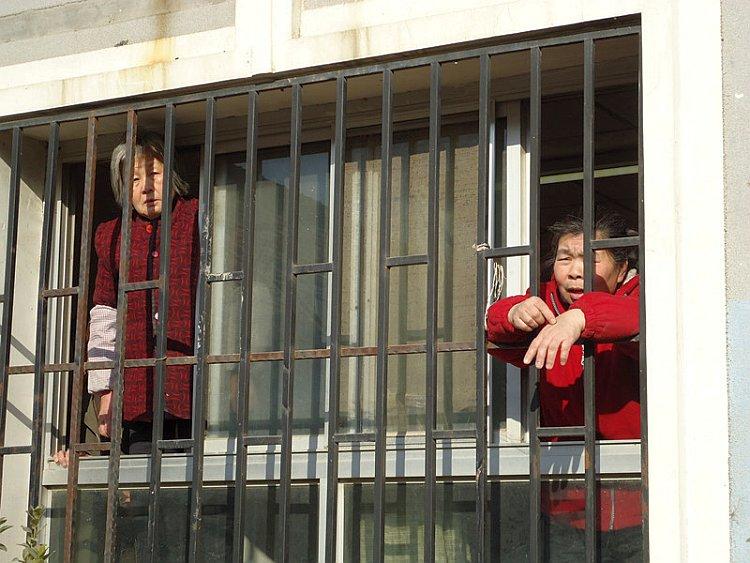Journalist: According to the 2004 annual report of Reporters without Borders, China is the largest prison for journalists, what is your current assessment of freedom of expression in China?
R.M Listen, the numbers show it: whether you look at the number of imprisoned journalists or the number of imprisoned cyber-dissidents, China is in the first category and the first at the top of all of our classifications. I don’t mean to displease all those who see in China only the Chinese market, but it remains the biggest prison for journalists, and not just for journalists, but also for anyone who opposes the government, for defenders of human rights and democracy. This is the reality; it can’t be ignored.
Today, there is still a whole group of foreign correspondents, in Beijing or elsewhere, who have a very hard time doing their work. There is a pile of issues in China that are very difficult for foreign journalists to broach [because] they risk running into trouble with the authorities.
People say in vain that “Oh yes, China is progressing, moving forward”. It is true that China is progressing, moving forward. It’s making progress in the economic domain; there things are getting done. Even in the domain of media [progress is being made]: there are more media outlets appearing. But when it comes to freedom of expression, from this [new] press, there hasn’t been progress. That’s important to say to today.
Remember when China was awarded the Olympic Games, we were told: “Yes, don’t you worry, you will see that receiving the Olympics will help improve the situation”. We were told, including by members of the International Olympic Committee: “yes, we have promises, guarantees, you will see that advances will be made and all.” What has advanced? There is no more freedom of the press today in China than there was at the moment they were awarded the 2008 Olympic Games. Of course not! There has been no improvement at all! Just fifteen days ago, a petition by all of the people that had protested against giving China the 2008 games was submitted to the International Olympic Committee in Switzerland. We submitted it to them, saying: “What have your received in exchange? Have there been improvements? Have there been [prisoner] releases? Have there been changes?” No! That is the reality in China today.
Journalist: What message would you pass on to countries or companies who, under pressure from the Chinese regime or out of certain interests, become in some ways accomplices to the Chinese government’s blocking of the press?
R.M.: You have a certain number of companies, a certain number of large corporations that, in order to have access to the Chinese market, accept things that they would not accept in any other country. When you see in the Internet market, a certain number of people—I don’t know, Yahoo, for example, which doesn’t accept the slightest censorship in Europe for instance—and rightfully so! Rightfully so!—[you see them] all at once accept to submit to the desires of the authorities in Beijing, to suffer a humiliating defeat, because they say: “Ah yes, there are 60, 70, 80 million internet-users in China, so, it’s worth the blow [to our morals]”. And we [RSF], we don’t stop denouncing this, this double talk that consists of saying “we have standards, an attitude regarding human rights and freedom of expression throughout the entire world”, but as soon as it comes to China, one is so obsessed with the business that could be done in China, that one is prepared in one stroke to forget, to change attitude, to be less strict. It’s unbelievable.
You know that a lot of these corporations have among their shareholders private investors, pension funds, bank investments, people who manage their money and put it into this or that enterprise. What is happening now is that we, RSF, are in the process of [speaking to these groups]. We went to see a certain number of pension funds and private investors, telling them: “wait, you say that you have ethical standards. That is very, very good. You are right. You don’t want to put your money in this company because it makes weapons. You don’t want to put your money in that company because it doesn’t provide proper working conditions for its employees. You don’t want to put your money in some other company because it pollutes. You are right, this is an ethical position, but the same position needs to be taken regarding a certain number of companies that go to the People’s Republic of China, that invest in the PRC, where there is no freedom, where the government demands promises [from investors] that no other state would dare demand”. I am no talking about the right to unionize or about pollution which are not even on the agenda. How is a satisfactory situation going to be obtained? I hope overall that the morals are applied in all cases rather than in some countries and not others, saying: “That’s how it is, we forgot ethics.”
Journalist: What do you think about the negotiations for a permanent contract between Eutelsat and the New Tang Dynasty television station?
R.M.: I met the Eutelsat executives, following the problems that your television station ran into. I told them that it is not possible to cede to the pressures from Beijing. I think they were ready to hear that and that they are not ready to give into Beijing’s pressure. As for me, they told me that a financial agreement had pretty much been reached, and that there wouldn’t be a financial problem, [Eutelsat] would not increase the service rate that you pay. I think that these are people with whom you can talk. Now, I think that from Eutelsat’s side, today they are prepared to sign a contract that would guarantee the station’s continued broadcast. I'd like to add that they have never discontinued the broadcast, although the previous contract technically terminated on April 15. So, I think we can be optimistic on that front.
Journalist: You know that there has been interference from the Chinese communist regime since the creation of these media outlets, but this has intensified since the publication of an editorial series in our paper called the Nine Commentaries on the Communist Party last November … In certain countries, publication of our paper has been suspended because of restrictions on [freedom of] opinion. What is your reaction upon seeing this?
R.M.: I do not deal with the question of what The Epoch Times says. I do not deal with the question of what NTDTV says. I am in favor of The Epoch Times being able to publish freely, quietly in any country where it is [established] and [am in favor] of countries resisting pressure from China. I know that there is pressure on certain and numerous countries. For NTD, it is the same. The ties with Falun Gong, that is not my concern. What Falun Gong thinks, that is not my concern. What I want, as the head of RSF, is to intervene every time a media outlet is bothered by the authorities.
I do not have to share the point of view of Falun Gong, of NTDTV or of The Epoch Times in order to intervene. What The Epoch Times says about the Chinese Communist Party, that is the Epoch Times’ affair. As for me, what I want is for The Epoch Times to be able to voice their thoughts. Then, if the Chinese do not agree, if the Chinese authorities do not agree, they voice their opinion, they respond, they protest. After all, they have enough newspapers to do so, enough television [stations] to do so, enough radio [stations] to do so, but they need to stop the pressure!
As far as my knowledge goes, I do not believe that The Epoch Times or NTD calls for armed struggle, they are not terrorist organizations, these are not people that are going to plant a bomb in China or who are calling for people to plant bombs in China. Therefore, these are people who have a legal right to express themselves. Every time that they have a problem, be it The Epoch Times, be it NTD, be it websites for cyber-dissidents, each time that we are informed, we will intervene. We have already intervened multiple times on behalf of the media outlets close to the Falun Gong religious movement. I do so each time and I will continue to do so! What these media outlets say is not a problem so long as there is no call for violence, as long as these are not terrorist organizations and as long as there is no unsubstantiated slander of this or that person. RSF is behind them because we support freedom of expression.
We intervene each time freedom of expression is at risk. Each time that there is a fatal consequence for freedom of expression, you can count on our intervening. We will do so every time. We will do so without stopping.
Journalist: Chinese President Hu Jintao is going to meet the president of the United States very soon, in the United States itself. Would you want to tell them anything?
R.M.: I will repeat what I have repeated each time. I will especially direct this message at the American authorities. You know that in the United States there is an amendment, which is called the first amendment and which makes [the U.S.] the number one country for freedom of the press. Though from time to time there are some failures, that [freedom] is really respected.
As for me, what I will try to tell the American authorities is: “when you receive Chinese leaders, you need to tell them that it is unacceptable, unacceptable that there are tens and tens of cyber-dissidents, tens and tens of journalists who are imprisoned for ”misdemeanors“ of opinion, because they do not think the same thing as the Chinese Communist Party.”
As for the Chinese leaders, I will tell them: “one day or another, you will have to accept freedom of the press, freedom of expression, and human rights. One cannot construct an economy that is worthy of this name [of a free economy] if at the same time, one does not respect [human rights]. You know that one might think that the economy can develop under authoritarianism, but at a certain moment this [development] creates a fragility for which you pay. You know that you cannot eternally continue violating the right to unionize. You also cannot eternally disrespect people’s freedom of expression without having this weaken the country’s economy some day. Even if one looks at this from the perspective of China’s interests, one must accept that there is a contradiction, one must accept that there are other points of view, that there needs to be pluralism of information. A strong country is a country that respects freedom within its borders. Having freedom of expression and divergent points of view doesn’t weaken a country, it makes it stronger.” That is what I would like to say to them.
Journalist: Recently, under the draconian control of the Communist Party in China, the journalists and editors of certain media outlets have responded with gestures of resistance. Two examples are the ten thousand word open letter from the editors of the Chinese Youth newspaper and the collective resignation of the editors of the Economic Observatory. Do you think that these expressions of dissatisfaction coming from the people regarding the control of the media are going to crumble the CCP’s monopoly over the media?
R.M.: We’ve seen that with a certain kind of repression things move, things are essentially in the process of moving, not only at the margins of the big media outlets, but also on the interior of the large media groups … One sees that there are things that are in the process of moving, because there are arrests, layoffs, resignations. It is for this reason that the West has an even larger role to play, because it is crucial that these people feel that they have support from the outside, that it is that China that is the China of the future. It is that China that we need to support; it is they that need our support on a daily basis.
You know that there is a minimal level of openness, including in the media. For the moment, [this openness] is often evident in the coverage of diverse topics, like sports, stories, a bit of sex and all that, but within all of this, there are things that are in the process of changing. You know that there are hundreds of thousands of new publications that are appearing. Could this happen without there being among the workers people who want to do their profession, in other words, people participating who want to [accurately] tell what is happening? This is why I am optimistic. Will it happen in 5, 10, 15 years? I have no idea. You know that people do not indefinitely accept having to fold before authority. Chinese journalists are no different this way than other journalists around the world.
Journalist: Do you think that it would be possible to have freedom of expression with the communist regime?
R.M.: I do not know of any Communist Party in history that accepted freedom of the press. I don’t know of any. [Freedom of the press] always happens once the party is no longer in power. Today, among the remaining communist countries—China, Cuba, Laos, Vietnam, and North Korea—do you know if any of have freedom of expression? Not a one! I believe that there is unfortunately a discrepancy between these communist parties that live the way they live, in other words, as the hegemon within their country, refusing the existence of any other political party—this is the case in China—and freedom of expression. I would like to say that freedom of expression goes together with political pluralism. When you reject political pluralism, freedom of religion, freedom to unionize, in general, you are not in favor of freedom of expression and freedom of the press, either. No, I believe that there is a discrepancy. I would like to be wrong, I would like to see the first Communist Party, in this case China’s, accept freedom of expression. But listen, I don’t see freedom to unionize, I don’t see religious freedom, I don’t see political freedom, I don’t see freedom in China in general.
Journalist: For the fifth anniversary of he Epoch Times, we are going to publish an album that tells of the creation and development of our newspaper and in which we want to also thank all those who have supported us, including RSF. Do you want to say a few words in this album?
R.M.: I want to say to the whole Epoch Times team: “you are right!” I want to tell them to have even more courage, because this is not obvious, because the Chinese authorities will not go easy on the team. You have an advocate in RSF, our support. I repeat, I do not necessarily share the opinions expressed in the paper, this is not the issue. I am in favor of freedom of expression, including the fact that we need to listen to points of view that are not our own, that are not necessarily the same opinions to which I subscribe, but you have friends here at RSF, we are here to help he Epoch Times, just as we are here to help all those who struggle to have views other than the authorities’ heard. So, good luck to your newspaper.
Journalist: Thank you very much.


